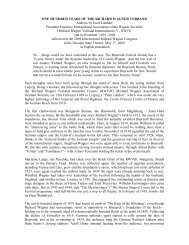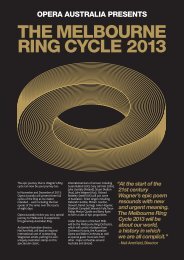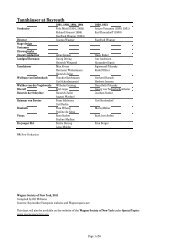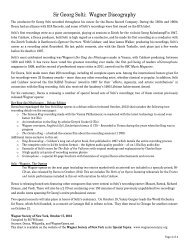Solti's Ring Remastered - Wagner Society of New York
Solti's Ring Remastered - Wagner Society of New York
Solti's Ring Remastered - Wagner Society of New York
You also want an ePaper? Increase the reach of your titles
YUMPU automatically turns print PDFs into web optimized ePapers that Google loves.
noise reduction systems were notorious for <strong>of</strong>ten removing overtones along with the tape hiss,sucking the ambience out <strong>of</strong> recordings while subtracting low-level musical sounds to thevanishing point. This made faint sounds crumble or disappear altogether and changed the timbre<strong>of</strong> instruments and voices. The best way to describe its effect is that it sounded sterile. Cedaritself advises to “use minimal processing,” warning that overuse <strong>of</strong> Cedar can “affect the desiredprogram content,” “leave undesirable artifacts,” and will “take the tops <strong>of</strong>f some (notably male)voices.” Warning <strong>of</strong> undesirable side effects, the Cedar Owner’s Manual almost comicallyadmonishes: “The optimum value <strong>of</strong> ‘Level’ is around the crossover point between the twittersand the glugging.”In fulfilling his corporate mandate to remove as much tape hiss as possible, Lockvaliantly tried to strike a balance between reducing hiss and excessively dulling the sound byattenuating the overtones. Lock continually varied the amount <strong>of</strong> noise reduction in an effort tobe contextually sensitive, endeavoring to mitigate Cedar’s well-known deleterious effects.Thankfully, I found the 1997 transfer to sound noticeably better than its 1984predecessor, which was made with an earlier, relatively primitive analog-to-digital converter.The 1997 edition seemed richer, warmer, and unfatiguing, coming close to the LPs, except forthe highest overtones. Oddly enough, two later Decca reissues <strong>of</strong> this same 1997 version werequite different, falling short in varied ways:2008 Decca “Originals” CD: This mid-priced reissue [4780382] was incorrectlydesignated on the front cover as “96kHz – 24-bit Remastering,” whether through duplicity orsheer carelessness (other non-96/24 analog recordings in this series simply said “Digitally<strong>Remastered</strong> Recording”). The mislabeling was highly misleading, as Decca later admitted that no96/24 remastering was ever made <strong>of</strong> any <strong>of</strong> the Solti <strong>Ring</strong> operas. It was merely the 1997, 48/24edition, but in degraded sonics. Although other CDs in the Decca “Originals” series have beenexcellent, this was, perversely, the worst <strong>of</strong> all Solti Rheingolds, sounding inexplicably dull andlifeless.2009 Decca “Heritage Masters” CD: This was a budget-priced reissue [4781403]without libretto or program notes, for which no claim <strong>of</strong> 96/24 remastering was made. Issued justnine months after the Decca “Originals” version, the difference was night-and-day. Cheaper wasbetter! It was as if someone had removed a scrim. However, the sound still didn’t match thequality <strong>of</strong> the full-price 1997 issue.2012 Decca Deluxe Limited Edition Third CD Issue: In a program note accompanyingthe latest limited edition, Decca disclosed that they did not go back to the original analog tapes tomake a new transfer. The <strong>of</strong>ficial excuse was that the master tapes were too deteriorated. Instead<strong>of</strong> making a high-resolution 96/24 transfer, they took a shortcut by utilizing the 1997 Cedarized48/24 digital audio tape transfer as the source, which was then enhanced by unspecified means.Engineer Philip Siney – who had been present when the late James Lock made the 1997 transfers(Lock left Decca in 1997 and died in 2009) – tweaked and massaged the 15-year-old digitizationin 2012, although Decca did not provide any technical details. Nonetheless, this was significantlybetter than any previous CD version when played on high-end equipment, rivaling the LPs.According to the company, a poor edit was corrected, a missing beat at Donner’s entry in Scene2 <strong>of</strong> Das Rheingold was replaced, and incidental studio noises were minimized.






